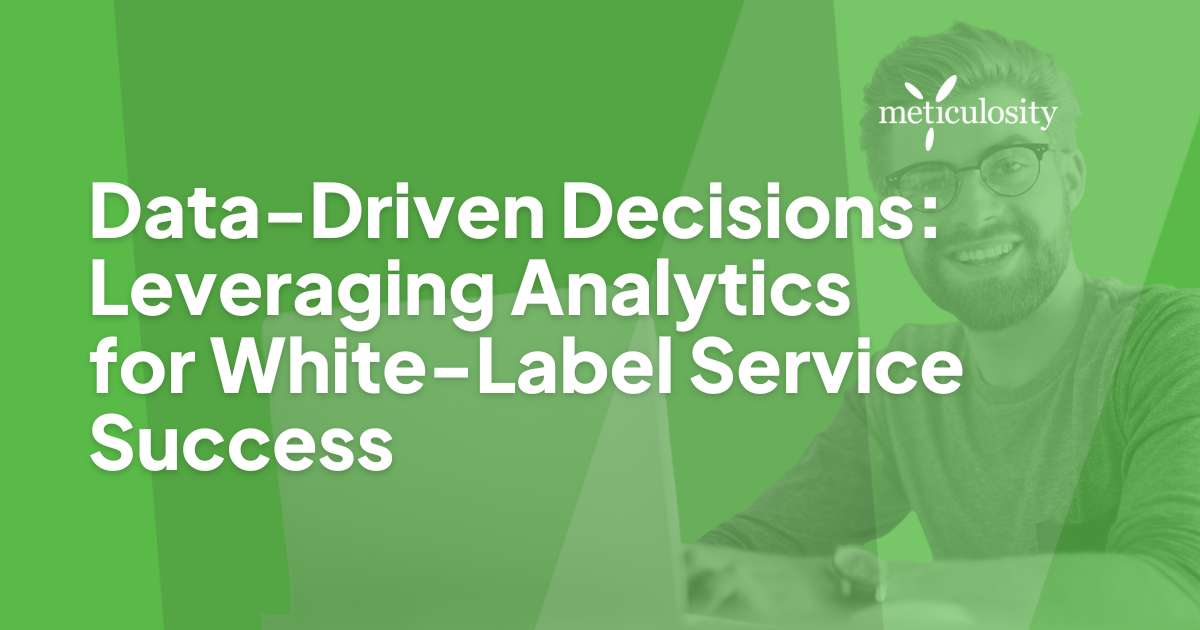Making strategic business decisions about where to invest your time and resources can often feel like navigating a complex maze.
Through research, we've harnessed these insights into pragmatic solutions that fuse analytics with the power of white-label services – all geared toward bolstering your business's performance.
Key Takeaways
- Using data helps make smart choices for businesses, like knowing where to spend money and how to fix problems. It helps see which parts of the business do well and what customers like.
- White-label SEO services let businesses give their clients better marketing without making all the tools themselves. They save time and money while helping clients get more people to visit their websites.
- Picking the right white-label analytics tool means thinking about what your business needs, if you can change how it works, and if it fits with what you already use.
- Tracking things like website visits and sales tells if strategies work well or need changes. This makes sure that decisions help the business grow in a good way.
- Staying up-to-date with technology means using new tools for analyzing data. This can lead to better ways of understanding what customers want and more growth for the business.
Why Data-Driven Decisions Are Important
Data-driven decisions are crucial for business success, providing valuable insights that influence strategic choices and improve overall performance. The impact of data on decision-making cannot be ignored, and leveraging analytics is essential for staying ahead in today's competitive market.
The impact of data-driven decisions on business success
We've seen firsthand how using data helps businesses do better. It's like having a map that shows you where to go and what to avoid. Companies that make decisions based on good data can spot trends, understand their customers better, and find new chances faster than others.
This often leads to more sales and happier customers because they get exactly what they want.
For agency friends out there, think of it this way: when we have solid numbers to back up our choices, we reduce guesswork and risks. Data tells us which parts of our service are top-notch and which might need some work.
In the end, making smart moves with help from good data can save money and time while boosting our reputation as experts who know how to grow a business right.
The Benefits of White-Label Services for Data-Driven Marketing
Leveraging white-label SEO services can significantly improve marketing strategies, while white-label analytics offers better results and insights for data-driven decision-making.
Leveraging white-label analytics for better results
By integrating white-label analytics into your marketing strategies, you can gain valuable insights for better results. These analytics provide in-depth data on customer behavior, trends, and campaign performance, enabling you to make informed decisions and optimize your marketing efforts accordingly.
With access to customizable dashboards and reports, you can track key performance indicators (KPIs) and measure the success of your data-driven strategies with efficiency and precision.
Leveraging white-label analytics allows for scalability and flexibility in adapting to changing market dynamics while collaborating with experts for innovative solutions tailored to your business needs.
Looking to empower your agency? You can learn more here.
Choosing the Right White-Label Analytics Solution
When it comes to choosing the right white-label analytics solution, it's important to assess your business needs, consider customization options and flexibility, and integrate analytics into existing processes for maximum impact.
These factors play a crucial role in leveraging data-driven decisions for success in your marketing strategies.
Assessing your business needs
Assessing your business needs is crucial before choosing a white-label analytics solution. Here's a detailed breakdown:
- Identify your specific marketing and analytics goals, such as improving SEO performance or enhancing customer targeting.
- Evaluate the current data sources and tools you have in place to understand their effectiveness and limitations.
- Consider the level of customization required for analytics solutions to align with your unique business requirements.
- Assess the scalability of the analytics solution to ensure it can grow with your business without compromising performance.
- Analyze the integration capabilities of the white-label analytics solution with your existing marketing technology stack.
- Take into account the ease of use and learning curve for implementing and utilizing the chosen analytics solution.
Customization options and flexibility
After understanding your business needs, the next step is exploring customization options and flexibility when selecting a white-label analytics solution. It's vital to look for a provider that offers customizable features to align with your specific requirements.
Flexibility in the platform allows you to adapt and scale as your business grows, ensuring that the analytics solution remains relevant and effective over time. Consider solutions that can be tailored to fit seamlessly into your existing processes, providing the flexibility needed for smooth integration without disrupting your operations or workflow.
When choosing a white-label analytics solution, it's essential to prioritize customization options and flexibility. These factors will empower you to tailor the analytics platform according to your unique business needs while maintaining agility for future growth and changes in technology or market demands.
Integrating analytics into existing processes
As we've discussed the importance of customization options and flexibility in choosing the right white-label analytics solution, it's crucial to focus on integrating analytics into existing processes.
It starts with understanding your current business operations and identifying where data-driven insights can make a significant impact. By seamlessly incorporating analytics into your existing workflows, you can ensure that real-time data continuously informs decision-making.
This involves training your team on leveraging these tools effectively and ensuring that the data flows smoothly through all relevant departments. With a well-integrated approach, you can harness the power of analytics to drive strategic decisions across marketing, sales, and customer service.
Tracking and Measuring Data for Success
Determining key performance indicators (KPIs) is crucial for tracking and measuring the success of data-driven strategies, allowing businesses to make informed decisions based on concrete metrics.
Using data to drive marketing strategies can lead to improved customer experience and targeted marketing efforts.
Determining key performance indicators (KPIs)
As a marketer or business professional, determining key performance indicators (KPIs) is crucial for measuring the success of your marketing strategies. Here are some important KPIs to consider:
- Website Traffic: Measure the number of visitors to your website and track where they're coming from to understand the effectiveness of your marketing efforts.
- Conversion Rate: Track the percentage of visitors who take a desired action on your website, such as making a purchase or signing up for a newsletter.
- Customer Acquisition Cost: Calculate how much it costs to acquire a new customer, including marketing and sales expenses, to ensure cost-effectiveness.
- Return on Investment (ROI): Determine the revenue generated compared to the amount spent on marketing campaigns to assess profitability.
- Customer Lifetime Value (CLV): Understand the total value a customer brings to your business over time to guide long-term marketing strategies.
Using data to make informed decisions
Data is a powerful tool to make informed decisions. By analyzing data, we can understand customer behavior, identify trends, and evaluate the success of our strategies. This helps us tailor our marketing efforts for better results and create a more personalized customer experience.
Data-driven decision-making provides valuable insights that guide us in allocating resources efficiently and maximizing our business impact.
Implementing data-driven strategies allows us to measure the effectiveness of our initiatives accurately. We can track key performance indicators (KPIs) closely, enabling us to adapt quickly based on real-time information.
Measuring the success of data-driven strategies
After using data to make informed decisions, it's crucial to measure the success of our strategies. Here are some key steps to effectively measure the success of data-driven strategies:
- Define clear Key Performance Indicators (KPIs) that align with business objectives and can be quantitatively measured.
- Utilize data analytics tools to track and monitor KPIs over time, allowing for real-time adjustments and improvements.
- Analyze the correlation between data-driven decisions and measurable outcomes, such as increased website traffic or higher conversion rates.
- Compare current performance metrics with historical data to gauge the impact of data-driven strategies on overall growth.
- Gather qualitative feedback from customers or stakeholders to complement quantitative data analysis, providing a comprehensive view of strategy effectiveness.

The Importance of Data in Marketing Strategies
Using data to understand customer behavior and preferences is crucial for effective marketing strategies, and white-label analytics can provide the insights needed to drive targeted marketing efforts.
The role of data in understanding customer behavior
Understanding customer behavior is crucial for any business, and data plays a key role in achieving this understanding. By analyzing customer data, you can gain valuable insights into their preferences, purchase patterns, and interactions with your brand.
This information allows you to tailor your marketing efforts better to meet the needs and expectations of your customers, ultimately leading to more effective strategies that resonate with your target audience.
Utilizing data to understand customer behavior enables businesses to create personalized experiences and targeted campaigns that drive engagement and loyalty.
Analyzing customer behavior through data empowers businesses to make informed decisions about product development, pricing strategies, and communication channels. With access to relevant data, marketers can identify trends and anticipate shifts in consumer preferences, enabling them to stay ahead of competitors and adapt quickly to changing market dynamics.
Using data for targeted marketing
After understanding customer behavior, the next step is to use data for targeted marketing. We can identify specific customer segments and their preferences by analyzing the gathered data.
This allows us to tailor our marketing strategies to resonate with each group, resulting in more personalized and impactful campaigns. Utilizing data for targeted marketing enables us to allocate resources efficiently and focus on reaching those most likely to engage with our products or services.
It empowers us to deliver relevant messages through the right channels, leading to higher conversion rates and a better return on investment.
Furthermore, leveraging data for targeted marketing helps us refine our messaging based on real-time feedback and performance metrics. We can continuously optimize our campaigns by tracking customer interactions and adjusting our approach accordingly.
The impact of data on customer experience
Data has a significant impact on customer experience. By analyzing data, we can understand customer behavior and preferences better. This insight allows us to create personalized and targeted marketing strategies, leading to improved customer satisfaction and loyalty.
Data helps in identifying pain points in the customer journey, enabling businesses to address these issues and enhance the overall experience for their customers.
Understanding how data influences the perceptions of our customers is crucial for making informed decisions that positively impact their interactions with our products or services.
Incorporating White-Label Analytics into Your Strategy
Integrating data-driven decision-making into your business processes is essential for staying competitive in today's market. To learn more about how you can leverage white-label analytics to drive success, continue reading.
Integrating data-driven decision-making into business processes
As a marketer or business professional, integrating data-driven decision-making into your business processes is crucial for success. Here are the steps to effectively incorporate this approach:
- Identify key areas where data can influence decision-making, such as customer behavior analysis and marketing campaign performance.
- Implement tools and platforms that enable real-time data collection and analysis to support informed decision-making.
- Train your team on how to interpret and utilize data effectively in their day-to-day activities.
- Create a company culture that values and prioritizes data-driven insights in all aspects of decision-making.
- Regularly review and adapt your data-driven processes based on the evolving needs of your business and industry trends.
- Collaborate with white-label solutions providers to customize analytics tools to fit seamlessly into your existing processes.
- Measure the impact of integrating data-driven decision-making by analyzing improvements in key performance indicators (KPIs).
- Continuously seek feedback from your team to address any challenges they may face with the implementation of data-driven strategies.
- Share success stories within your organization to encourage ongoing support for data-driven decision-making across all departments.
- Stay updated on advancements in white-label analytics solutions and consider incorporating new features or technologies into your existing strategy.
Working with white-label solutions providers
When integrating data-driven decision-making into business processes, working with white-label solutions providers is crucial for maximizing the benefits. These providers offer customizable analytics tools and services that can be seamlessly integrated into your existing marketing strategies.
By partnering with a reputable white-label solutions provider, you can access advanced analytics capabilities without the need to develop them in-house, enabling you to leverage cutting-edge technology and expertise for better decision-making.
White-label solutions providers also allow you to adapt quickly to changing market demands by offering flexible and scalable options tailored to your specific business needs. With their support, you can overcome data management and analysis challenges while maximizing the potential of data-driven strategies for driving growth and success in your marketing endeavors.
Overcoming challenges and maximizing benefits
As business professionals, we understand that incorporating white-label analytics into your strategy can come with challenges. However, by maximizing the benefits, you can overcome these challenges and drive success:
- Embrace change and foster a data-driven culture within your organization to ensure team buy-in and alignment.
- Invest in training and education to empower your employees with the skills needed to effectively utilize data and analytics tools.
- Foster collaboration between marketing, sales, and customer service teams to ensure a holistic approach to leveraging data for decision-making.
- Implement robust data governance practices to ensure data quality, security, and compliance with regulatory requirements.
- Continuously evaluate and optimize your data-driven strategies based on insights gained from analytics to stay ahead of the competition.

Conclusion
You can leverage data to make informed decisions and drive business growth by incorporating white-label analytics into your strategy. The benefits of white-label services for data-driven marketing are significant, from improving strategies to understanding customer behavior and enhancing the overall customer experience.
You can adapt to changing trends and maximize success in a rapidly evolving market by choosing the right white-label analytics solution and tracking key performance indicators. Real-world examples illustrate that businesses have used data-driven strategies to achieve remarkable results, showcasing the immense potential of leveraging analytics for white-label service success.
Click here to learn more about agency marketing.
FAQs
1. How can marketing agencies leverage data analytics in conjunction with white-label services to make informed business decisions?
-
- Performance Analysis: Agencies can use data analytics to assess the performance of white-label services, identifying areas of strength and improvement.
- Client Insights: Analytics provide insights into client behavior, preferences, and satisfaction levels, guiding agencies in tailoring white-label services to meet client expectations.
- Market Trends: Data analytics help agencies stay informed about market trends, enabling them to align white-label offerings with current industry demands.
2. In what ways does data analytics enhance the efficiency and effectiveness of white-label service delivery for marketing agencies?
-
- Optimizing Resource Allocation: Data analytics assist in optimizing resource allocation, ensuring that agencies allocate resources efficiently based on project demands and client needs.
- Quality Control: Analytics help agencies implement quality control measures by tracking key performance indicators, ensuring consistent and high-quality delivery of white-label services.
- Proactive Issue Resolution: Agencies can proactively identify and address issues by leveraging analytics, minimizing disruptions, and enhancing overall service effectiveness.
3. Can data analytics be used to measure the ROI of white-label services and justify their value to clients?
-
- ROI Calculation: Data analytics enable agencies to calculate the return on investment (ROI) of white-label services, providing quantitative metrics to justify their value to clients.
- Client Reporting: Analytics-driven reports can be shared with clients, transparently showcasing the impact and value generated by white-label services, fostering trust and long-term partnerships.
- Continuous Improvement: By analyzing data, agencies can identify areas for improvement and iterate on strategies to enhance the overall ROI of white-label services.
4. How does integrating data analytics with white-label services contribute to marketing agencies' long-term success and competitiveness?
-
- Strategic Planning: Data analytics support strategic planning by providing insights into market trends, client preferences, and the performance of white-label services, helping agencies make informed decisions.
- Continuous Improvement: Agencies can use analytics for continuous improvement, refining white-label offerings based on data-driven insights to stay competitive and relevant in the long term.
- Client Satisfaction: Leveraging data analytics to enhance service delivery contributes to increased client satisfaction, promoting long-term success through positive client relationships.
The integration of data analytics with white-label services empowers marketing agencies to make informed decisions, optimize service delivery, measure ROI, and position themselves for long-term success in a competitive landscape.








